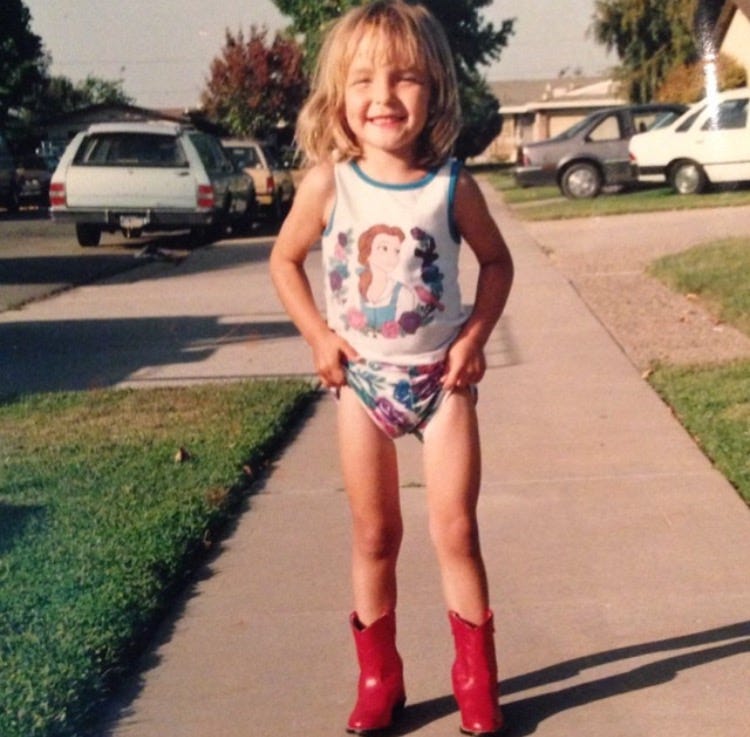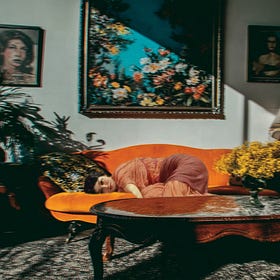whatever happened to lazy summers?
a meditation on plastic chairs, pickle jars, and the art of being bored
HAPPY FIRST WEEKEND OF SUMMER, WILD ONES 🌞
I am six years old, suspended in a white plastic lawn chair on my grandmother's front lawn, and time has no meaning. There's a jar of pickles within arm's reach—the kind that makes that satisfying pop when you twist off the lid—and a can of Dr Pepper sweating in the summer heat beside my inflatable pool. My little white sunglasses reflect the world back at itself, and I am the center of everything and nothing at all. The living, as Gershwin knew, was easy.
This is my summer archetype, the image that surfaces whenever I try to understand what we've lost in our march toward digital omnipresence. It's embarrassingly simple: a suburban kid in the 1990s, marinating in the particular alchemy of boredom and contentment that defined childhood summers before screens colonized our attention spans. But maybe that simplicity is precisely the point.
There's something almost archaeological about examining that memory now, like uncovering pottery shards from a civilization we can barely remember. The texture of those plastic chairs—how they'd leave geometric impressions on the backs of your legs. The way sprinkler water tasted different from tap water, somehow more alive. The profound satisfaction of peeling the backing off a fresh box of chalk, then spreading them across the sidewalk to color elaborate chalk cities and hopscotch mazes that would vanish with the next rain.
We lived outside in those days, not by choice exactly, but by default. Summer meant the expulsion from air-conditioned classrooms into the wild temporality of long days with no clocks. We rode bikes through neighborhoods—not to destinations, but for the pure kinetic joy of movement, the wind in our faces, the satisfying click of baseball cards clothespinned to spokes. We played with hoses and sprinklers, transforming suburban lawns into water parks through nothing more than imagination and the physics of water pressure (remember kinking the hose and then unkinking it when your cousin would pick it up to see why the water turned off? lol)
The Germans have a word—Gemütlichkeit—that encompasses warmth, belonging, and good cheer, but no English equivalent quite captures what we had in those pre-digital summers. It was something more expansive than coziness, more grounded than happiness. It was presence, unmediated and unscheduled. The Italians call this dolce far niente: the sweetness of doing nothing.
I've been thinking about this a lot lately, especially as I watch the confident weeds growing in summer's full expression, envying their certainty, their unquestioned right to grow exactly where they are. There's something about summer that still carries the ghost of that childhood presence, even as we've grown increasingly skilled at fragmenting our attention across multiple screens, notifications, and the endless scroll of other people's curated moments.
But here's what haunts me: I'm not sure we can ever fully return to that quality of attention. Psychologists call it "rosy retrospection"—our tendency to remember the past more fondly than we experienced it. Maybe those summers weren't as perfect as I remember. Maybe I'm romanticizing what might have been, in reality, just long stretches of unstructured time that occasionally felt magical.
Yet something fundamental shifted when we moved from analog boredom to digital stimulation. The boredom of my childhood summers wasn't empty—it was generative. It was the space where imagination flourished, where we learned to be alone with our thoughts, where we discovered that time could stretch and breathe. When you had nothing to do, you had to become interesting to yourself.
Summer was our temporal sanctuary, a season-long reprieve from the structured time of school and the scheduled activities of other seasons. It operated on what anthropologists call "natural time"—the rhythm of sun and shadow, hunger and satisfaction, tiredness and rest. We ate when we were hungry, napped when we were tired, played until the streetlights came on and our mothers called us home.
Now summer feels different. Even as adults seeking that elusive work-life balance, we struggle to create the kind of expansive presence that once came naturally. We plan our leisure, schedule our relaxation, document our joy for social media consumption. We've become tourists in our own lives, always slightly removed from direct experience by the constant presence of our devices.
I wonder sometimes if this is why summer nostalgia hits so hard—it's not just missing childhood, but missing a way of being in the world that we've systematically dismantled. Those confident weeds don't check notifications or worry about optimizing their growth patterns. They just grow, unquestioned and unquestioning, rooted in the present moment.
There's a particular quality of light that takes me back—late afternoon sun slanting through suburban trees, the way it painted my grandmother's front lawn in gold. I can still feel the weight of that plastic chair beneath me, the sticky sweetness of pickle juice on my fingers, the Dr Pepper fizz on my tongue. For a moment, I'm six again, suspended in time, completely present in my own small corner of the world.
Maybe that's what we're really mourning when we think about pre-digital summers: not the specific trappings of 1990s childhood, but the capacity for direct presence. The ability to be exactly where we are, when we are, without the constant pull of elsewhere. The confidence of those weeds, growing exactly where they're planted, making no apologies for taking up space.
I don't know if we can fully reclaim that quality of attention—and honestly, maybe we shouldn't have to. Adult life comes with responsibilities that make complete presence a luxury six-year-olds could afford because someone else was paying the bills and watching the clock. But there's something unsettling about how completely we've surrendered those moments of expansive time, how we've let our devices colonize even our attempts at rest.
Maybe the real loss isn't summer itself, but our belief that we deserve pockets of unproductive time. That we're allowed to sit in plastic chairs with pickle juice on our fingers, watching shadows lengthen across the lawn, without optimizing the experience or documenting it for later consumption. The weeds don't feel guilty for growing where they please—perhaps the question isn't whether we can return to childhood summers, but whether we can remember that we, too, have an unquestioned right to occupy space exactly as we are.
I hope you enjoy your first weekend of summer and find some time to sit around and do nothing, if you please. I’m off to buy some pickles. xo
MORE FROM WILD BARE THOUGHTS ❤️🔥
Do you ever just miss old versions of *you*?
I caught myself smiling at something today and realized I hadn’t smiled like that in years.
some thoughts on not letting small things ruin big energy
My dog spilled my coffee the other morning. Not in some dramatic cartoon way—just a slow, casual nudge of her nose. She’s tall enough to reach up and over my desk, and in that moment, she just wanted…
the art of outgrowing yourself
I’m turning 36 this week so pardon me while I go through all the existential spirals ツ













It's nice to know that you could still have the kind of childhood in the nineties that I enjoyed twenty years earlier! Today, everything is indeed planned, especially leisure time. Sometimes I ask (mostly young) parents why they are constantly helicoptering, why they are increasingly restricting their children's activity radius, why they are playing the parent taxi even though the route could be easily reached on foot or by bike. The answer always comes in two parts: it used to be much safer back then, and everything is completely different today. But is it really? Or does it have to be that way?
Omg I love this one! I need to read it again because this piece is so picturesque that it is difficult to summary it or tell someone what it is about without giving it them to read!